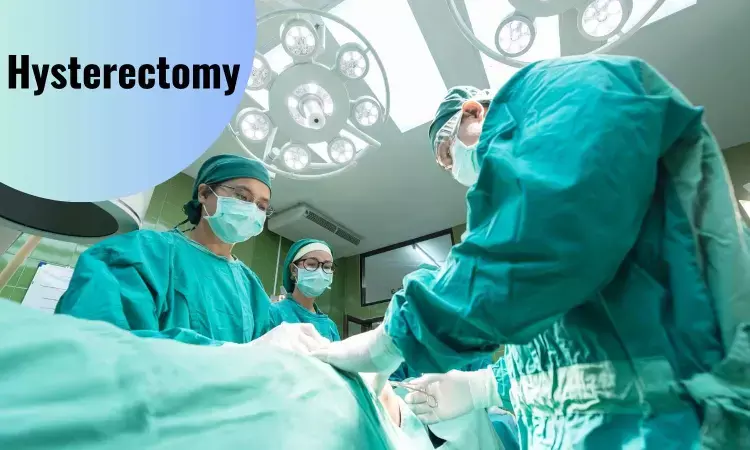- Home
- Medical news & Guidelines
- Anesthesiology
- Cardiology and CTVS
- Critical Care
- Dentistry
- Dermatology
- Diabetes and Endocrinology
- ENT
- Gastroenterology
- Medicine
- Nephrology
- Neurology
- Obstretics-Gynaecology
- Oncology
- Ophthalmology
- Orthopaedics
- Pediatrics-Neonatology
- Psychiatry
- Pulmonology
- Radiology
- Surgery
- Urology
- Laboratory Medicine
- Diet
- Nursing
- Paramedical
- Physiotherapy
- Health news
- Fact Check
- Bone Health Fact Check
- Brain Health Fact Check
- Cancer Related Fact Check
- Child Care Fact Check
- Dental and oral health fact check
- Diabetes and metabolic health fact check
- Diet and Nutrition Fact Check
- Eye and ENT Care Fact Check
- Fitness fact check
- Gut health fact check
- Heart health fact check
- Kidney health fact check
- Medical education fact check
- Men's health fact check
- Respiratory fact check
- Skin and hair care fact check
- Vaccine and Immunization fact check
- Women's health fact check
- AYUSH
- State News
- Andaman and Nicobar Islands
- Andhra Pradesh
- Arunachal Pradesh
- Assam
- Bihar
- Chandigarh
- Chattisgarh
- Dadra and Nagar Haveli
- Daman and Diu
- Delhi
- Goa
- Gujarat
- Haryana
- Himachal Pradesh
- Jammu & Kashmir
- Jharkhand
- Karnataka
- Kerala
- Ladakh
- Lakshadweep
- Madhya Pradesh
- Maharashtra
- Manipur
- Meghalaya
- Mizoram
- Nagaland
- Odisha
- Puducherry
- Punjab
- Rajasthan
- Sikkim
- Tamil Nadu
- Telangana
- Tripura
- Uttar Pradesh
- Uttrakhand
- West Bengal
- Medical Education
- Industry
Hysterectomy may increase metabolic syndrome and cardiovascular disease risk among women: Study

A cluster of conditions including high blood pressure, high blood sugar, excess body fat around the waist and abnormal cholesterol or triglyceride levels called as metabolic syndrome is known to significantly elevate the risk of cardiovascular disease (CVD) and all-cause mortality. A recent study published in the recent issue of American Journal of Obstetrics and Gynecology finds a concerning connection between hysterectomy and metabolic syndrome risk in women.
The Multi-Ethnic Study of Atherosclerosis analyzed data from a total of 3,367 female participants by focusing on their history of hysterectomy, oophorectomy, hystero-oophorectomy and metabolic syndrome prevalence. The results revealed startling associations that even with ovarian preservation, hysterectomy was found to be independently linked to a higher risk of metabolic syndrome.
29% participants of the total patient group underwent hysterectomy and 22% participants underwent oophorectomy. Over a median follow-up period of 10.5 years, close to 750 metabolic syndrome events were recorded. The analysis showed that both hysterectomy and hystero-oophorectomy significantly elevated the risk of incident metabolic syndrome when compared to women who did not undergo either procedure.
The findings raise concerns about the long-term health implications of hysterectomy for various gynecological conditions. While previous research highlighted strong associations between hysterectomy with bilateral salpingo-oophorectomy and metabolic syndrome, this comprehensive study suggests that even with ovarian conservation, hysterectomy may independently contribute to the metabolic syndrome risk.
This research found significant implications for the health of women by highlighting the importance of understanding the potential risks associated with gynecological surgeries. If further studies confirm these findings, clinicians may need to reconsider screening and preventive strategies for the women who undergo ovary-sparing hysterectomy.
The study emphasized the need for continued investigation into the mechanisms underlying these associations. Understanding the biological pathways involved could pave the way for more targeted interventions and personalized approaches to women's health.
The major findings of this study suggest that it is crucial for healthcare providers to carefully weigh the risks and benefits of hysterectomy and other gynecological procedures with considerations of the potential long-term impacts on metabolic health. The study underlines the importance of comprehensive healthcare strategies that address the immediate concerns and also the long-term outcomes for women who undergo gynecological surgeries.
Reference:
BRONI, E. K., ECHOUFFO TCHEUGUI, J. B., PALATNIK, A., GRAHAM, E. M., TURKSON-OCRAN, R.-A., COMMODORE-MENDAH, Y., NDUMELE, C. E., & MICHOS, E. D. (2024). Associations between Hysterectomy and Metabolic Syndrome: The Multi-Ethnic Study of Atherosclerosis. In American Journal of Obstetrics and Gynecology. Elsevier BV. https://doi.org/10.1016/j.ajog.2024.04.035
Neuroscience Masters graduate
Jacinthlyn Sylvia, a Neuroscience Master's graduate from Chennai has worked extensively in deciphering the neurobiology of cognition and motor control in aging. She also has spread-out exposure to Neurosurgery from her Bachelor’s. She is currently involved in active Neuro-Oncology research. She is an upcoming neuroscientist with a fiery passion for writing. Her news cover at Medical Dialogues feature recent discoveries and updates from the healthcare and biomedical research fields. She can be reached at editorial@medicaldialogues.in
Dr Kamal Kant Kohli-MBBS, DTCD- a chest specialist with more than 30 years of practice and a flair for writing clinical articles, Dr Kamal Kant Kohli joined Medical Dialogues as a Chief Editor of Medical News. Besides writing articles, as an editor, he proofreads and verifies all the medical content published on Medical Dialogues including those coming from journals, studies,medical conferences,guidelines etc. Email: drkohli@medicaldialogues.in. Contact no. 011-43720751


